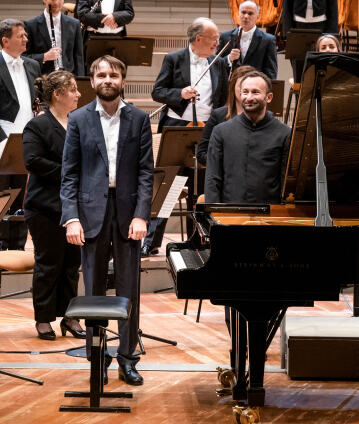Concert with Kirill Petrenko and Daniil Trifonov

In this concert, Daniil Trifonov presents himself for the first time with the Berliner Philharmoniker as a Beethoven interpreter – with the Third Piano Concerto, whose charm lies in the alternation of heroic gesture and dreamlike contemplation. At the same time, it is a musical homage to Mozart, who Beethoven greatly admired. Mendelssohn’s First Symphony, which he wrote at the age of 15, was also inspired by Mozart. An early work, yet it points to the style of the mature composer. “It sounds so wonderfully pithy and light, that the sudden glimpses of another, hidden world really do surprise” (Der Tagesspiegel).
When Ludwig van Beethoven premiered his Third Piano Concerto, he really made his page turner sweat: He saw “almost nothing but empty pages with here and there what looked like Egyptian hieroglyphs, unintelligible to me; he played almost the entire part purely from memory”. Beethoven, the composing virtuoso, had the part in his head – and he no doubt improvised here and there to test the effect on the audience.
The C minor Piano Concerto, as it was later published, is a tribute to Mozart’s own contribution to the genre in the same key – and a very personal work. During the years in which the concerto was composed, Beethoven experienced an initially happy, but hopeless love affair due to the higher status of his beloved; he suffered from depression, which he described in his Heiligenstadt Testament, and he began to lose his hearing. Despite everything, he did not let it get him down: “I will seize fate by the throat; it shall certainly never wholly overcome me.” His piano concerto seems to reflect this credo: after many musical struggles, the hopeful C major prevails in the end.
Felix Mendelssohn in his First Symphony also moves from C minor to C major. Of course, he was familiar with the famous examples of Mozart and Beethoven. But although the young composer was inspired by his colleagues and even borrowed a motif from Mozart’s G minor Symphony No. 40, his aim here was clearly to find his own tone – an expression for the emotional world of his era. And this was no longer the revolutionary pathos of Beethoven’s age. In Mendelssohn’s time, the focus was on the inner world, it was fascinated by the supernatural and found the darker aspects of human nature in mysterious natural phenomena. This can be heard in the bewitching second theme of the finale: first just plucked strings, then a clarinet melody – as if from another world.
© 2020 Berlin Phil Media GmbH
Related interview
Artists
Our recommendations
- Mariss Jansons and Daniil Trifonov with Schumann’s Piano Concerto
- Kirill Petrenko and Daniil Trifonov
- 2024 New Year’s Eve Concert with Kirill Petrenko and Daniil Trifonov
- Piano recital with Daniil Trifonov
- Andris Nelsons and Daniil Trifonov
- 2016 New Year’s Eve Concert with Simon Rattle and Daniil Trifonov